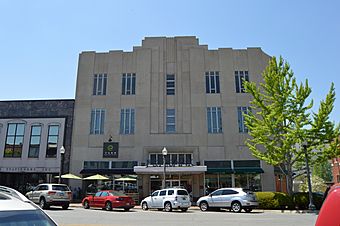Rogers Department Store facts for kids
|
Rogers Department Store
|
|

The building in April 2014
|
|
| Location | 117 N. Court St., Florence, Alabama |
|---|---|
| Area | less than one acre |
| Built | 1910 |
| Architect | Hulsey & Hall |
| Architectural style | Art Deco |
| NRHP reference No. | 98001025 |
Quick facts for kids Significant dates |
|
| Added to NRHP | August 14, 1998 |
Rogers Department Store was a popular chain of stores, a bit like a big mall in one building, that started in Florence, Alabama. It began in 1894 and grew to have many locations across the Tennessee Valley area. The main building, built in 1910, is so special that it was added to the Alabama Register of Landmarks and Heritage in 1994 and the National Register of Historic Places in 1998. This means it's an important historical place!
Contents
History of Rogers Department Store
How It All Began
The story of Rogers Department Store started in 1894. Benjamin A. Rogers and his sons moved to Florence, Alabama, during a time when the local economy was growing very fast. This growth was happening because a new canal was being built to help boats get around the Muscle Shoals on the Tennessee River.
The Rogers family built a two-story wooden building for their new department store. Their store was special because it was one of the first in the area to put clear price tags on everything. Before this, people often had to bargain or negotiate prices, so knowing the price upfront was a big change!
Fires, Rebuilding, and Growth
Sadly, Benjamin Rogers passed away in 1902. Then, in 1910, the store building burned down. But the Rogers sons didn't give up! They quickly rebuilt a new, stronger two-story building.
Later, in 1946, another fire damaged the store. After this fire, the building was made even bigger, becoming three stories tall. Rogers Department Store also opened new locations in other towns nearby, like Muscle Shoals, Decatur, and Athens.
The Store Changes Hands
The Rogers family owned and ran the store for a very long time, until 1998. That year, they sold the company to another business called The Dunlap Company.
After the sale, the downtown Florence store closed its doors in 2001. The other Rogers stores also closed over the next few years: the Athens store in 1996, the Decatur store in 2006, and the Muscle Shoals store (located at Southgate Mall) in 2007.
Today, the old Florence building is still busy! The ground floor has different shops, including an Asian fusion restaurant, Jos. A. Bank, and Alabama Outdoors. The upper floors are used as offices for the Martin Supply Company.
Building Design and Features
Art Deco Style
The Rogers Department Store building is a three-story structure designed in the Art Deco style. This style was popular in the 1920s and 1930s and often features geometric shapes, sleek lines, and decorative details. The building has a large interior space, covering over 65,500 square feet (about 6,100 square meters).
The original parts of the building were made from solid brick. After the 1946 fire and expansion, some parts were rebuilt using concrete block and strong reinforced concrete walls.
Outside the Building
The back of the building, which faces a narrow alley next to a parking garage, still shows its original brick. You can even see where old arched windows used to be on the first two floors, along with two chimneys.
The front and side of the building are covered in smooth, light-colored limestone. Look closely, and you might spot cool decorations: carved ram's heads on the rounded corner and along the side!
There are two main entrances, one at the front and one on the side. Large display windows with aluminum frames line the front, perfect for showing off items when it was a department store. The very bottom of the building has a polished pink granite base.
The Art Deco look of the building really stands out on the top two floors. Each section of windows is set back a bit, and they have three parts: a central casement window surrounded by fixed glass panels. Limestone panels stick out between these window sections, rising slightly above the roofline. In the middle of the front and twice on the side, there's an even more recessed section that projects higher above the roof.
Inside the Store
Inside, both the first and third floors have mezzanines. A mezzanine is a low balcony or partial story between two main floors.
The Rogers Department Store was also one of the first places in North Alabama to have modern conveniences like elevators. It also had central air conditioning and heat, which was a big deal back then!
The building is located right across Mobile Street from Southall Drugs, another historic building also listed on the National Register of Historic Places.



